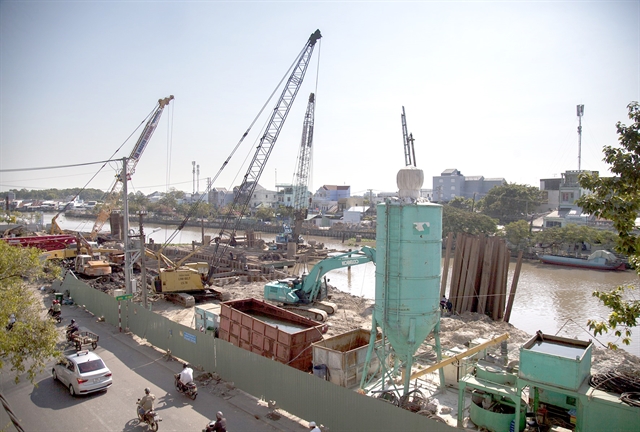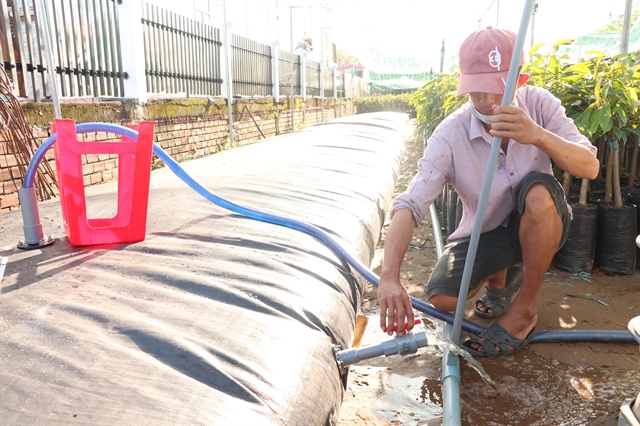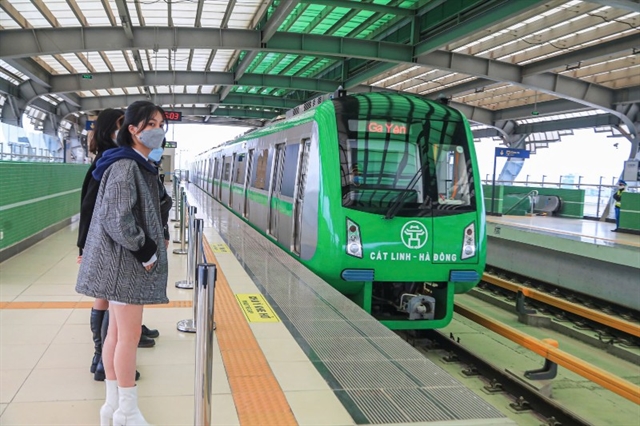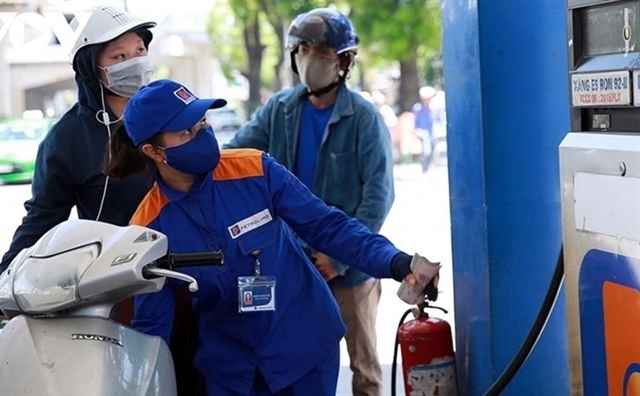 Environment
Environment

Saltwater intrusion has occurred on a large scale in the Cửu Long (Mekong) Delta, forcing local authorities to take measures to protect agricultural production and ensure water supply for household use, according to the Ministry of Agriculture and Rural Development.

|
| Construction of the Kênh Nhánh Sluice to prevent saltwater intrusion in Kiên Giang Province’s Rạch Giá City. — VNA/VNS Photo Hồng Đạt |
HCM CITY — Saltwater intrusion has occurred on a large scale in the Mekong Delta, forcing local authorities to take measures to protect agricultural production and ensure water supply for household use, according to the Ministry of Agriculture and Rural Development.
Saltwater intrusion has affected many provinces like Tiền Giang, Bến Tre, Trà Vinh, Vĩnh Long, Sóc Trăng, Kiên Giang and Cà Mau.
Salinity rates of four parts per thousand (PPT) have been recorded 40-70 kilometres upstream from the coast, 10-15 km further inland than usual during the dry season.
Some 82,000 households in the delta, mostly in Tiền Giang, Bến Tre, Sóc Trăng, Kiên Giang and Cà Mau, face a water shortage.
Trần Bá Hoằng, head of the Southern Irrigation Institute, said the saltwater intrusion is very severe this year, coming early, entering deeper inland and likely to last for a long period.
“The winter-spring crop will be affected heavily because of the freshwater shortage.”
In Cà Mau, the saltwater has affected more than 20,000 households, 16,500ha of shrimp-rice farms and more than 24,000ha of rice farms.
Lê Văn Sử, vice chairman of the provincial People’s Committee, has instructed local authorities to share water and use the water remaining in canals to save rice and other crops.
He called on the Cà Mau Clean Water and Rural Environment Sanitation Centre to check each household and take measures to supply water to them.
In Bến Tre, the provincial People’s Committee on Tuesday declared an emergency due to saltwater intrusion and ordered relevant agencies to take urgent measures to cope with it.
The situation in the main rivers is as bad as it was in the record 2015-16 dry season.
Nguyễn Khánh Hoan, head of the province's Irrigation Sub-department, said saltwater intrusion would continue to worsen.
Most areas in Bến Tre are already suffering from salinity of one part per thousand.
Water used for irrigating rice, fruits and certain other crops should have a salinity rate of less than 0.5 PPT.
Farmers have taken effective measures to store water like using giant plastic bags with a capacity of 50cu.m, building tanks and putting plastic sheets on pond beds.

|
| A huge plastic bag is used for storing irrigation water in Bến Tre Province amid severe saltwater intrusion. — VNA/VNS Photo Huỳnh Phúc Hậu |
Irrigation projects
Nguyễn Hữu Lập, vice chairman of the Bến Tre People’s Committee, said the province has assigned priority to building temporary dams to keep out saltwater intrusion and to store freshwater.
It has also prioritised supply of water to households, he said.
The province has 46 sites from where farmers can draw water to measure salinity to know if it is suitable for irrigation.
In Vĩnh Long Province, salinity rates in many areas exceed the rates of 2015-16.
Authorities have implemented a number of projects to mitigate the impacts.
They have dredged 83 irrigation works, upgraded 27 water supply projects, invested in water pumps, and used 10,000 existing borewells to ensure there is enough water for irrigation and household use.
Lê Quang Trung, vice chairman of the Vĩnh Long People’s Committee, said the province has warned people about the damages caused by saltwater intrusion to ensure they participate in measures to prevent it.
The Kiên Giang People’s Committee has instructed relevant agencies to prevent saltwater intrusion.
The province has built a comprehensive sluice system to keep out saltwater along the An Biên-An Minh coast.
The Kiên Giang Clean Water and Rural Environment Sanitation Centre has stored water in reservoirs and dredged wells on islands.
It has also handed out plastic containers with a capacity of 2cu.m and water treatment chemicals to each household situated far from the supply network.
The ministry has instructed delta provinces to prevent saltwater intrusion, store water and ensure water is used efficiently.
It sped up work on 19 major irrigation projects meant to prevent saltwater intrusion, and two thirds have been completed and put into use.
They are helping prevent saltwater intrusion in 50,000-60,000ha of farmlands and indirectly helping another 30,000ha.
The saltwater intrusion in the delta is expected to worsen from the end of this month and last until April. — VNS




